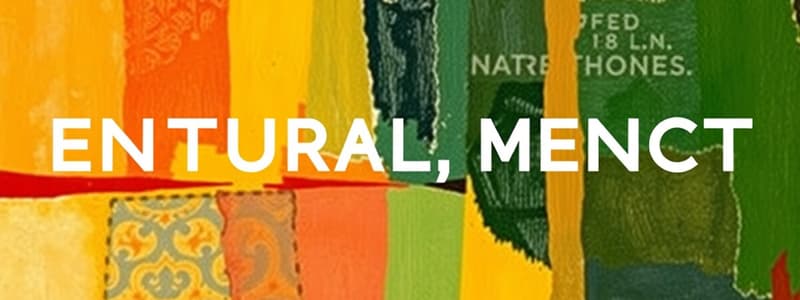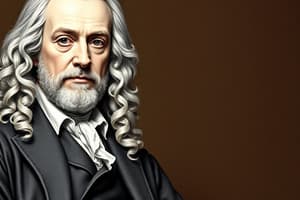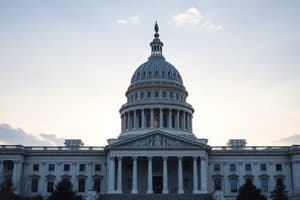Podcast
Questions and Answers
How did the Enlightenment shift power dynamics in society?
How did the Enlightenment shift power dynamics in society?
It shifted power from hereditary rulers to the people, inspiring revolutions and promoting democratic ideals.
What are the three fundamental natural rights identified during the Enlightenment?
What are the three fundamental natural rights identified during the Enlightenment?
Life, liberty, and property.
What role did Montesquieu's ideas play in the development of democratic governance?
What role did Montesquieu's ideas play in the development of democratic governance?
Montesquieu's separation of powers established checks and balances that helped prevent tyranny.
How did Voltaire contribute to the Enlightenment view on societal openness?
How did Voltaire contribute to the Enlightenment view on societal openness?
What approach did Rousseau advocate for regarding government and social contracts?
What approach did Rousseau advocate for regarding government and social contracts?
What philosophical movement emphasized reason and individual liberties during the 18th and 19th centuries?
What philosophical movement emphasized reason and individual liberties during the 18th and 19th centuries?
How did reason contribute to the development of natural rights according to John Locke?
How did reason contribute to the development of natural rights according to John Locke?
What concept did Montesquieu introduce to protect individual rights?
What concept did Montesquieu introduce to protect individual rights?
In what way did Voltaire use reason to address societal issues?
In what way did Voltaire use reason to address societal issues?
What is the social contract as proposed by Rousseau?
What is the social contract as proposed by Rousseau?
Why was reason considered a significant shift from tradition during the Enlightenment?
Why was reason considered a significant shift from tradition during the Enlightenment?
How did the Enlightenment thinkers influence modern political thought?
How did the Enlightenment thinkers influence modern political thought?
What role did critical inquiry play in the Enlightenment?
What role did critical inquiry play in the Enlightenment?
Flashcards
Enlightenment View of Social Progress
Enlightenment View of Social Progress
The belief that human society can improve through reason and reform.
Natural Rights
Natural Rights
The idea that people have inherent rights to life, liberty, and property that governments cannot take away.
Separation of Powers
Separation of Powers
A system where power is divided between different branches of government, preventing any one branch from becoming too powerful.
Popular Sovereignty
Popular Sovereignty
Signup and view all the flashcards
Social Contract
Social Contract
Signup and view all the flashcards
What was the Enlightenment?
What was the Enlightenment?
Signup and view all the flashcards
How was reason important in the Enlightenment?
How was reason important in the Enlightenment?
Signup and view all the flashcards
What are natural rights?
What are natural rights?
Signup and view all the flashcards
Explain Montesquieu's idea of separation of powers.
Explain Montesquieu's idea of separation of powers.
Signup and view all the flashcards
What did Voltaire advocate for?
What did Voltaire advocate for?
Signup and view all the flashcards
Describe Rousseau's idea of the social contract.
Describe Rousseau's idea of the social contract.
Signup and view all the flashcards
What was the impact of the Enlightenment on democracy?
What was the impact of the Enlightenment on democracy?
Signup and view all the flashcards
Why was liberty important to Enlightenment thinkers?
Why was liberty important to Enlightenment thinkers?
Signup and view all the flashcards
Study Notes
Enlightenment: Core Concepts
-
Emphasis on Reason: The Enlightenment prioritized reason over tradition, faith, and existing social structures. This involved critical analysis, logical thinking, and observation to understand the world, challenging existing authority. Key thinkers used reason to explore new ideas.
-
Natural Rights: Enlightenment thinkers, like John Locke, advocated for inherent rights—life, liberty, and property—possessed by all individuals, regardless of social status, and not subject to government control.
-
Separation of Powers: Montesquieu proposed separating governmental powers to prevent tyranny. By dividing governmental responsibilities among different branches, he aimed for checks and balances to ensure individual rights were protected.
-
Popular Sovereignty: Rousseau's concept of the social contract emphasized self-governing through popular (citizen) sovereignty. This involved individuals participating in and influencing the governing of their society.
-
Individual Liberty and Freedom: Enlightenment thinkers like Voltaire championed freedom of speech and religion, advocating against censorship and intolerance. This challenged traditional authority and promoted widespread individual freedoms.
Impact of Reason on Enlightenment Thought
-
Challenging Traditional Authority: The emphasis on reason directly challenged established authorities, including traditional religious dogma and hereditary rulers.
-
Inspiring Revolutions: Enlightenment ideals of individual liberty and popular sovereignty inspired revolutionary movements across the globe, challenging the existing political order.
-
Shaping Modern Political Thought: The core concepts of the Enlightenment, centered on reason and individual rights, greatly influenced modern political thought and democratic ideals.
Social Progress in Enlightenment Perspective
-
Belief in Societal Improvement: Enlightenment thinkers believed societies could improve through the application of reason and reform. This involved a shift toward reforming political and social structures.
-
Challenges to Traditional Hierarchies: Enlightenment principles challenged traditional social hierarchies and championed individual progress, aiming to broaden access to education and opportunities.
-
Individual Liberties as a Driving Force: Concepts like natural rights and limited government fostered individual liberties, potentially leading to social improvements, broader freedoms, and societal advancements.
-
Promoting Openness and Tolerance: Enlightenment thinkers, including Voltaire, actively challenged intolerance and promoted the importance of freedom of speech and religion, thereby influencing a more open and tolerant society.
Studying That Suits You
Use AI to generate personalized quizzes and flashcards to suit your learning preferences.




